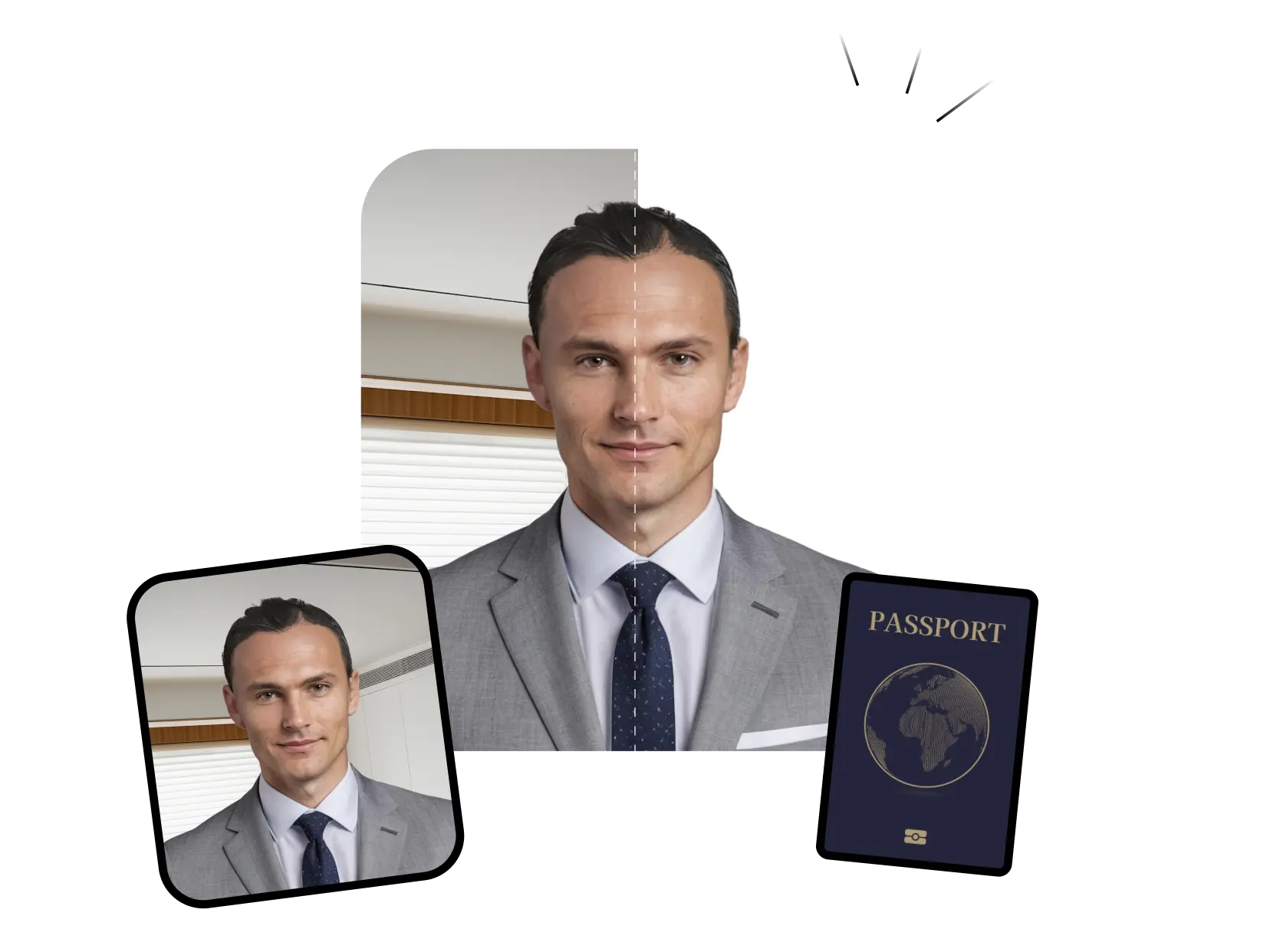How to Get the Perfect Passport Photo ?
Capture the ideal passport photo in just seconds, effortlessly!

Select

Processing

Vertification








UAE Passport Photo
40x60 mm
300 dpi
FCFCFC
38 mm
6 mm
https://u.ae/en/information-and-services/passports-and-traveling/the-emirati-passport
Recent photo: The picture should be taken within the last six months to accurately show your current appearance.
Photo dimensions: The photo should be 35 mm x 40 mm for a passport application and 43 mm x 55 mm for a visa application. Your face should occupy 70-80% of the photo.
Quality: The photo must be in color, clear, and in sharp focus. It must also be printed on high-quality photographic paper with no ink marks or creases. The image must not be retouched or digitally altered and should clearly show your natural skin tone.
Background: Use a plain, light-colored background for passport applications and a plain white background for visa applications with no patterns or shadows. There should be a clear contrast between your face and the background.
Head position: Look directly at the camera without tilting your head. Your head and shoulders should be level and centered in the frame.
Facial expression: You should have a neutral expression with your eyes open and visible and your mouth closed.
Lighting: Make sure the light is even and doesn’t cast shadows or create glare on your face or in the background.
Eyeglasses: If you must wear glasses, choose thin frames that don’t block your eyes. Your eyes should still be clearly visible, and there must be no glare on the lenses. Tinted lenses and sunglasses are not allowed.
Head coverings: Hats and head coverings are only allowed for religious reasons and should not cast a shadow on your face. Your facial features, from the top of your forehead to the bottom of your chin and the edges of your face, must still be visible.
Hair and clothing: Wear regular dark clothes that contrast with the white background. Your hair shouldn’t cover your eyes or hide your face. Minimal jewelry is allowed.
Eyes visibility: This might require timing and patience with infants, as capturing them with their eyes open isn't always easy. Glasses should only be worn if necessary for medical reasons, and there should be no reflection on the lenses.
Facial expression: Unlike adults, who must maintain a neutral expression, children and infants are given some flexibility. However, it's best to capture them with a relaxed expression and their mouth closed.
Clothing: Dress your child in simple, everyday outfits that don’t cover their face. Avoid hats and pacifiers. If a child must wear headwear for religious purposes, their face must still be fully visible.
No visible support: If you need to hold the child to keep them upright, make sure that your hands or any part of your body are not showing in the photo.
Focus on the child: Do not use any props. The photo should only include the child, without other people or distractions.
Hepatitis A: Advised due to potential exposure through food or water in the UAE, no matter how clean your eating place looks.
Hepatitis B: Suggested for travelers who may engage in activities that increase their risk of bodily fluid exposure, such as sexual activity, tattooing, piercing, or medical procedures.
Measles: Advised for babies from 6 to 11 months old, considering the global outbreaks in recent times.
Rabies: Not a significant risk for all visitors but recommended for those engaging in outdoor activities that might bring them into contact with animals like bats, dogs, and other mammals.
Typhoid: Advisable for those who love to explore local cuisines and will be spending time in less urbanized areas, as typhoid can be contracted through contaminated food or water.
Yellow fever: Travelers over 9 months old from countries with a risk of yellow fever transmission must show a vaccination certificate. This also applies to those who've transited more than 12 hours through an airport in a country at risk of yellow fever.
Keep up with the UAE's COVID-19 policies, including quarantine, testing, or vaccination requirements, by checking with your airline or visiting the National Emergency and Crisis and Disasters Management Authority (NCEMA) website.
Cities like Dubai and Abu Dhabi Offer a broad spectrum of healthcare services, meeting everything from urgent care needs to specific medical treatments.
Private healthcare facilities Are known for their superior care, attracting many expatriates and visitors. These places are often preferred for their convenience and English-speaking personnel.
Pharmacies Are easy to find and stocked with a range of prescription and over-the-counter medications. Nonetheless, it's a good idea to carry any necessary medication you're already taking along with your prescription, just in case.
compensation for any issues with your travel plans, such as cancellations, delays, or disruptions.
Medical treatment expenses and evacuation If necessary.
Reimbursement for lost baggage.
Extreme heat: The UAE's desert environment means it can really heat up. Stay hydrated, apply sunscreen, and choose light, breathable clothing to stay comfortable.
Cultural sensitivity: The UAE is a Muslim country, and local customs and laws reflect this. Dress modestly in public places like malls and eateries. During Ramadan, be aware that eating and drinking in public during daylight isn't permitted.
Water and food safety: While you can generally drink tap water in the UAE, if you're prone to stomach troubles, bottled water might be a safer bet. Be cautious with street food and opt for food that's been properly cooked.
Local laws and etiquette: Brush up on local regulations to avoid any mishaps. Alcohol consumption is restricted, drug laws are stringent, public displays of affection should be minimal, and photographing certain buildings, like government and military facilities, is off-limits.
Environmental risks: Sand and dust storms can occur and impact air quality. If you have respiratory issues, it's best to stay indoors during major storms and maybe use an air purifier.
Photography: Be careful when taking pictures, particularly of government buildings, military areas, or individuals who haven't agreed to be photographed. Unauthorized photography can lead to legal trouble.
Declare all medications: Always inform customs about any medications you're bringing into the country, especially prescription or controlled substances.
Original packaging is a must: Keep your medications in their original packaging, clearly labeled with your name and the prescription.
Carry a prescription or doctor's note: Bring documentation from your doctor, such as a note or a current prescription, explaining why you need the medication.
Check for restrictions: Make sure none of your medications are prohibited or tightly controlled in the UAE. To bring certain medications, you'll need approval. You can apply online via the electronic application form. For the latest details, it's wise to reach out directly to the UAE Ministry of Health website.
Only take what you need: To minimize complications, pack only the medication you'll need for your trip.



